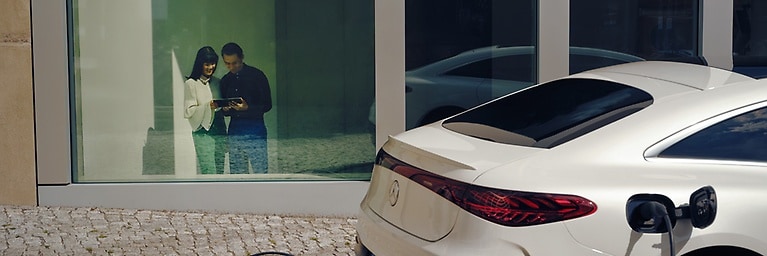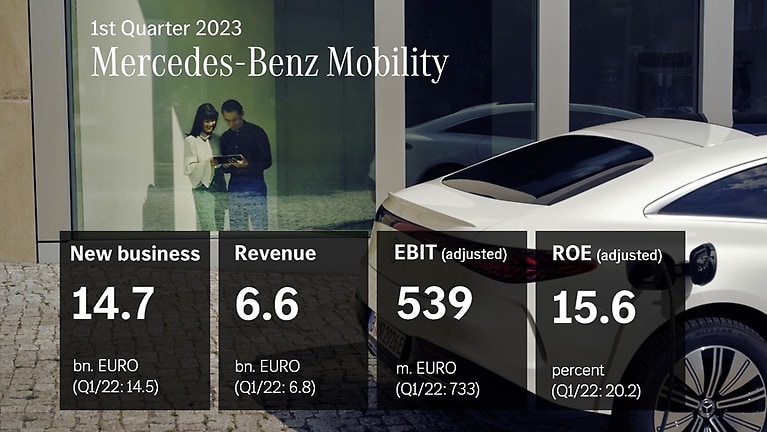
Mercedes-Benz Mobility AG
Siemensstr. 7
70469 Stuttgart
Deutschland
Tel.: +49 711 17 0
E-Mail: mobility@mercedes-benz.com
Please send queries about content on this website to any contact. You can address your concerns to us in English and your respective national language.
Represented by the Board of Management: Franz Reiner (Chairman), Jörg Lamparter, Susann Mayhead, Tolga Oktay, Peter Zieringer
Chairman of the Supervisory Board: Harald Wilhelm
Commercial Register Stuttgart, No. HRB 737788
VAT registration number: DE 81 11 20 930

Mercedes-Benz Group AG (ticker symbol: MBG) achieved healthy first quarter financial results thanks to a rise in sales of Top-End vehicles and premium vans. Improved pricing outweighed headwinds from material costs. Together with higher sales, as well as a favorable product mix, it resulted in Earnings Before Interest and Taxes (EBIT) of €5.5 billion (Q1 2022: €5.2 billion). First-quarter revenue increased 8% to €37.5 billion (Q1 2022: €34.9 billion) and adjusted EBIT rose to €5.4 billion (Q1 2022: €5.3 billion). Six consecutive quarters of delivering double-digit margins demonstrate resilience and a structurally uplifted business performance.
Strong sales of G-Class, Mercedes-AMG and Mercedes-Maybach vehicles helped Mercedes-Benz Cars to achieve an adjusted Return on Sales of 14.8%. At Mercedes-Benz Vans the adjusted Return on Sales reached 15.6%, boosted by improved pricing and deliveries of large vans. The shift towards greater electrification continues, with sales of Battery Electric Vehicles at Mercedes-Benz Cars up 89% and rising 22% at Mercedes-Benz Vans.


“Our focus on Top-End cars and premium vans has made Mercedes-Benz more weatherproof, allowing us to accelerate our digital and electric transformation – even in a period of economic uncertainty. Ongoing cost discipline, combined with further key product launches like the all-electric Mercedes-Maybach EQS SUV [1] will keep us on track to continue delivering sustainable results.”
Harald Wilhelm
Chief Financial Officer of Mercedes-Benz Group AG
Mercedes-Benz continues to transform at full speed towards an all-electric software-driven future. The Mercedes-Maybach EQS SUV [1], an all-electric Top-End vehicle, was presented at Auto Shanghai 2023 following the introduction of a plug-in hybrid version of the Mercedes-Maybach, the S 580 e[2] earlier in the year. With the Mercedes-Maybach EQS SUV [1], the company presented an EQ model tailor-made for delivering further growth in China and the U.S.. In the first quarter, the company also presented its strategy for MB.OS, its proprietary software operating system. As part of its ESG efforts to make Mercedes-Benz a more sustainable company, a groundbreaking ceremony for a battery recycling plant was held in Kuppenheim, Germany and Mercedes-Benz signed a 140 megawatts Power Purchase Agreement (PPA) with Iberdrola to access green energy for production. The company’s Green Finance Framework was also expanded to include green asset backed securities.
The free cash flow of the industrial business increased to €2.2 billion (Q1 2022: €1.2 billion). The net liquidity of the industrial business rose to €28.9 billion (end of 2022: €26.6 billion). The Group’s investments in property, plant and equipment in the first quarter totaled €0.8 billion (Q1 2022: €0.9 billion). Research and development expenditure amounted to €2.5 billion (Q1 2022: €2.0 billion) due to higher investments for future platforms and technologies, including MB.OS. In February 2023, the Board of Management and the Supervisory Board of Mercedes-Benz Group AG resolved to conduct a share buyback program. Beginning in March 2023, own shares worth up to €4 billion (not including incidental costs) are intended to be acquired on the stock exchange over a period of up to two years and shall subsequently be cancelled.
Compared to the first quarter of the previous year, Mercedes-Benz Mobility was able to more than double the new business volume for BEVs (battery electric vehicles) to €1.2 billion (Q1 2022: €0.5 billion). At the end of March 2023, the contract volume amounted to €131.3 billion staying at the same level as year-end 2022 (FY 2022: €132.4 billion). With €14.7 billion, the new business of Mercedes-Benz Mobility also remained at the prior-year level (Q1 2022: €14.5 billion). The adjusted EBIT decreased to €539 million (Q1 2022: €733 million) mainly impacted by higher interest rates and slightly increased investments towards a digital and seamlessly integrated customer experience within Mercedes-Benz. As a result, the adjusted Return on Equity (RoE) reached 15.6% in the quarter (Q1 2022: 20.2%).

At Mercedes-Benz Cars, sales reached 503,483 units (+3%) in the first quarter, despite ongoing supply-chain disruptions, economic headwinds and geopolitical uncertainty. Mercedes-Benz passenger car (excl. smart) BEV sales more than doubled in the first three months (+119%), and electric vehicles reached 10% of overall sales in Q1. Sales in the Top-End segment rose to 91,772 units (+18%). Mercedes-AMG sales increased by 44% to 40,330 units, based on new vehicle launches and a strong performance in the SUV segment. In the Core segment, sales reached 248,383 units (-11%) impacted by model changeovers for the top-selling GLC and E-Class. Sales in the Entry segment grew by 27% to 163,328 units in the first quarter. smart sales reached 5,358 units (-14%).
Mercedes-Benz Vans significantly increased its global sales in the first quarter of 2023 to 98,885 units (+12%) despite the continuing challenges in logistics. Global sales of all-electric vans increased significantly in the first quarter of 2023 to 3,570 units (Q1 2022: 2,925). Thus, the share of all-electric models in total sales amounts to 4%. The adjusted Return on Sales for Mercedes-Benz Vans rose to 15.6% (Q1 2022: 12.6%) thanks to a strong contribution from commercially positioned vans. In February, the division presented the new eSprinter which received highly favorable feedback from media and customers.
Russia: As of this week, Mercedes-Benz successfully transferred its Russian business activities to Avtodom, a step which had no significant effects on profitability and cash flows. For Mercedes-Benz Mobility the company expects a loss in the low triple-digit million euros range, once the sale becomes effective. No significant effects are expected on liquidity and capital resources.
With regional differences, overall growth momentum of the world economy is likely to remain rather subdued for the rest of the year. High, albeit gradually declining inflation rates in many markets combined with very restrictive monetary policies at major central banks, are likely to continue to weigh on growth. In addition, the recent turbulence in the US and European banking sectors brought new uncertainties for the further development of the global economy. Geopolitical imponderables remain another uncertainty factor. By contrast, energy prices are expected to be less volatile than in the previous year. In addition, global supply bottlenecks are expected to ease further, which should benefit the development of global automotive markets.
Overall demand: In Europe incoming orders remained sluggish in the first quarter. The current order bank supports sales in the coming months. In the United States demand continues to remain on a good level. In China momentum returned post Chinese New Year with strong demand and order intake at the end of Q1.
New business at Mercedes-Benz Mobility is seen slightly above the prior-year level. Contract volume is now expected at the prior-year level. Revenue is seen slightly below the prior-year level. The adjusted RoE is seen at 12%–14%.
Unit sales at Mercedes-Benz Cars seen at the prior-year level with revenue remaining at the prior-year level. Adjusted RoS is seen at the upper end of 12%–14% and the adjusted Cash Conversion Rate at 0.8–1.0. Investments in property, plant and equipment are seen significantly above the prior-year level. Research and development expenditures are now seen significantly above the prior-year level mainly due to MB.OS, AMG.EA and MB.EA.
At Mercedes-Benz Vans, unit sales are now seen slightly above the prior-year level. Revenue is seen significantly above the prior-year level and adjusted RoS is now expected in the range of 11%–13%. The adjusted Cash Conversion Rate is expected at 0.6–0.8. Investments in property, plant and equipment are seen significantly above the prior-year level. Research and development expenditures are expected to be significantly above the prior-year level.
The Mercedes-Benz Group expects revenue at the prior-year level and EBIT slightly below the prior-year level. Free cash flow of the industrial business is expected at the prior-year level. CO2 emissions of the new vehicle fleet in Europe are expected to be significantly below the prior-year level. [3]
Link to capital market presentation Q1 2023:
group.mercedes-benz.com/q1-2023
Fuel consumption and emissions data:
[1] Mercedes-Maybach EQS 680 SUV (provisional figures: combined power consumption: 24.4-22.5 kWh/100 km; CO2 emissions: 0 g/km)
[2] Mercedes-Maybach S 580 e (provisional figures, fuel consumption combined, weighted: 1.0-0.8 l/100 km, CO2 emissions combined, weighted: 23-18 g/km, electricity consumption combined, weighted: 25.0-22.9 kWh/100 km)
[3] Average CO2 emissions of the new car fleet of newly registered Mercedes-Benz cars in Europe (European Union, Norway and Iceland) in the reporting year as measured on the basis of the WLTP, i.e. including vans that are registered as passenger cars.